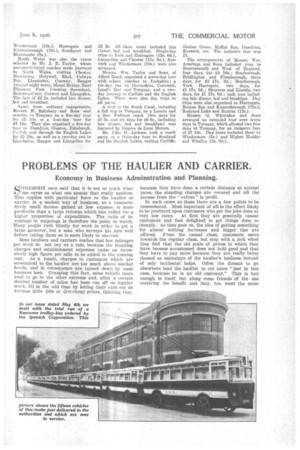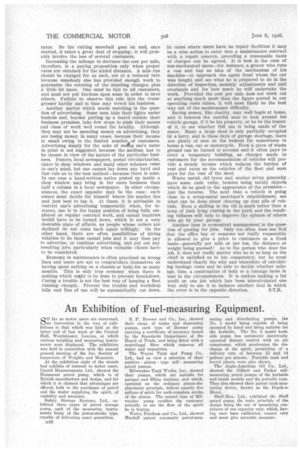PROBLEMS OF THE HAULIER AND CARRIER.
Page 23

Page 24

If you've noticed an error in this article please click here to report it so we can fix it.
Economy in Business Adminstration and Planning.
OMEBODY once said that it is not so much what
one earns as what one spends that really matters. This applies with particular force to the haulier or carrier in a modest way of business, as a comparatively small income gained at low expense is more profitable than a large revenue which has called for a higher proportion of expenditure. The ratio of incomings to outgoings is therefore the point to watch. Many people rush blindly for work in order to get a large,1urnover, but a man who surveys his jobs well before taking them on is more likely to succeed.
Most hauliers and carriers realize that low mileages per week do not pay as a rule, because the standing charges and establishment expenses cause an excessively high figure per mile to be added to the running cost. As a result, charges to customers which are economical to the haulier are too much above market levels, and in consequence are turned down by most business men. Grasping this fact, some vehicle users tend to go to the other extreme and, after a certain desired number of miles has been run off on regular work, fill in the odd time by letting their cars out on various little job§ at dirt-cheap prices, thinking that,
because they have done a certain distance at normal rates, the standing charges are covered and all the income from the " extras " is profit. In such cases as these there are a few points to be remembered. Most important of all is the effect likely to be produced upon customers who get the jobs done at very low rates. At first they are generally casual customers and feel delighted to get things done so cheaply. As time goes on, the idea of getting something for almost nothing increases and bigger tips are offered. From the casual class, customers move towards the regular class, but stop with a jerk when they find that the old scale of prices to which they have become accustomed does not hold good and that they have to pay more ecause they are really being classed as mainstays of the haulier's business instead of only incidental helps. Often the threats to go elsewhere lead the haulier to cut rates "just in this case, because he is an old customer." This is bad enough in itself, but along come friends of the one receiving the benefit and they, too, want the same rates. So the cutting snowball goes on and, once started, it takes a great deal of stopping ; it will probably involve the loss of several customers.
Increasing the mileage to decrease the cost per mile, .therefore, is a paying proposition only when proper rates are obtained for the added distance. A mile run should be charged for as such, not at a reduced rate because somebody else has provided enough work to guarantee the covering of the standing charges, plus a little bit more. One must be fair to all customers, and must not put burdens upon some in order to save others. Failure to observe this rule hits the transgressor hardly and in time may wreck his business. . Another matter which needs watching is the question of advertising. Some men hide their lights under bushels and, beyond putting up a board outside their business premises, take few steps to push their names and class of work well round the locality. Although they may not be spending money on advertising, they are losing money in many eases, because their income is small owing to the limited number of customers. Advertising simply for the sake of seeilLg one's name in print is not suggested, because the medium has to be chosen in view of the nature of the particular business. Posters, local newspapers, postal circularization, space in shop windows and many other schemes come to one's mind, but one cannot lay down any hard and fast rule as to the best method—because there is none. In one ease a hand-written notice posted up inside a shop window . may bring in far more business than half a column in a local newspaper. In other circumstances, the exact opposite may be the case; each owner must decide for himself where his market lies and how best to tap it. At times, it is advisable to restrict one's advertising temporarily when, for instance, one is in the happy position of being fully employed on regular contract work, and casual inquiries would have to be turned down, which is not a very desirable state of affairs, as people whose orders are declined do not come back again willingly. On the other hand, there are often possibilities of hiring vehicles to do these casual jobs and it may then pay to advertise, or continue advertising, and put out any resulting jobs, particularly when valuable clients have .to be considered.
Economy in maintenance is often practised on wrong lines and users are apt to congratulate themselves on having spent nothing on a chassis or bodyifor so many months. This is only true economy when there is nothing which ought to be done to prevent breakdown. Curing a trouble is not the best way of keeping a fleet running cheaply. Prevent the trouble and workshop bills and kiss of use will be automatically cut down.
In cases where users have no repair facilities it may, be a wise action to enter into a maintenance contract with a repair concern, providing a reasonable basis of charges can be agreed. It is best in the case of non-mechanical users—for instance, a grocer who runs a van and has no idea of the mechanism of his machine—to approach the agent froni whom the car was bought and see what he is prepared to do in the direction of inspection, monthly adjustments and unit overhauls and for how much he will undertake the work. Provided the cost per mile does not work out at anything much more than the figure quoted in our operating costs tables, it will most likely be the best way out of the maintenance difficulty.
Saving money, like charity, may well begin at home, and it behoves the careful man to look around his vehicle garage, if it be his property, or he be the tenant of it, to see whether full use is being made of the space. Many a large shed is only partially occupied by a lorry, and in these days of garage shortage, there are plenty of men on the lookout for somewhere to house a van, car or motorcycle. Even a piece of Waste ground can be turned to account and it often pays to erect a temporary building, as charges made to customers for the accommodation of vehicles will provide a steady income which reduces the burden of rent and rates on the vehicles of the fleet and soon pays for the cost of the shed.
Waste metal, old tyres and similar scrap generally , have some cash value, besides being untidy objects which do no good to the appearance of the premises— just the reverse. The next time a vehicle is going close to a scrap-metal merchant's establishment, see what can be done about clearing up that pile of rubbish. Even a shilling in the till is much better than a heap of junk lying rusting in the yard, and the resulting tidiness will help to improve the opinion of others who go by your garage.
Another item in economical management is the question of quoting for jobs. Only too often does one find that the office boy or someone not really responsible is allowed to give a price to customers on a fixed basis—generally per mile or per ton, the distance or weight being guessed ! As to the person who does the job, it does not really matter who he is so long as the chief is satisfied as to his competency, but lie must understand clearly the why and wherefore of calculating haulage costs and be able to decide whether mileage, time, a combination of both or a tonnage basis is best in the circumstances. It is useless making a fat profit on one job which has been miscalculated one way only to use it to balance another deal in which
the error is in the opposite direction. S.T.R.




























